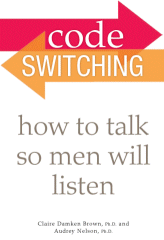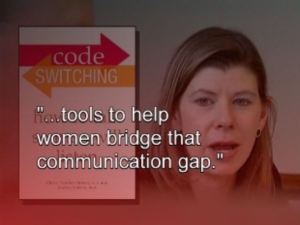Code Switching Goes to Korea!
 I was recently asked by the State Department to conduct programs for four days for the US Embassy in South Korea. I interacted with target audiences in a variety of formats and venues in Seoul and other major cities in the Republic of Korea. I addressed how enhancing inclusion through critical gender relationships and cultural awareness can leverage South Korea’s female talent pool. I was recently asked by the State Department to conduct programs for four days for the US Embassy in South Korea. I interacted with target audiences in a variety of formats and venues in Seoul and other major cities in the Republic of Korea. I addressed how enhancing inclusion through critical gender relationships and cultural awareness can leverage South Korea’s female talent pool.
Although Korean women tend to be exceptionally well educated, one of the highest education levels among the OECD (Organization for Economic and Cooperative Development), their economic participation is at or near the bottom of the OECD. Korea’s treatment of women remains far behind the nation’s economic and political clout on the world stage. The crux of the gender problems lie with the poor communication among men and women in Korea. The rapid increase of women in the workforce has only exacerbated gender tensions and conflict, raising the need for better communication. The objective was to assist Koreans in the development of communication tools to narrow the gap between Korean women’s high education and their lofty credentials with their participation and treatment in the workplace.
During one of my presentations to the US Embassy staff, Ambassador Stephens commented on the definition of Code Switching and said “that is what we do here every day. We interact with different cultures and modify our behaviors.” Additionally, this week I had an interview request with a Southern newspaper that is doing a feature story on the concept. The focus of that story was code switching in the classroom with different African-American dialects.
The ability to go from one culture to another requires knowledge of both cultures and the flexibility to move in and out of them with a synergistic blend. Do you work with someone who only knows one style and does not have the skills or adaptive ability to modify their style to fit the requirements of the situation? That person could use some coaching in code switching.
What is Code Switching? And what are the underlying assumptions?
It is a blend of the two styles into a more synergistic approach to leadership and communication.
It's dynamic and ever-changing, based on its code switching roots.
It's strong and soft, aggressive and straightforward, compassionate and not afraid of emotions.
It is adaptable and flexible meeting the needs of the situation and context.
Underlying Assumptions of Code Switching
- Different is good! We don’t all want to be the same. Boring!
- Not a male bashing.
- Women do not want to become men!
- Shared equal opportunity: both men and women are responsible for successful communication!
- Code Switching not only applies to a context
of gender but also to a context of cultural differences.
|
|
Audrey Nelson PhD. is an international trainer, consultant and author who works with organizations to increase their productivity and profitability thorough winning communication strategies.
You can reach Audrey at audrey@audreynelson.com
or at 303.448.1800 O or 303.448.1802 C.
|
Have you checked out Audrey’s blog on Psychology Today?
Did you know that Audrey was invited by the editors at Psychology Today to participate as a gender communication expert on the Psychology Today blog . Check it out!
Current Article
Benjamin Disraeli is credited with having said that there is no index of character so sure as the voice. Indeed, it's not what we say, but how we say it that's important. When we open our mouths we reveal all kinds of things about ourselves that have nothing at all to do with the words .we are uttering.
|
|
Coming soon |
 Audrey will conduct an interview on Code switching 9 am to 10 am MST
September 24th Friday - Seed to Sky Radio, "Growing Businesses Small to Tall" Audrey will conduct an interview on Code switching 9 am to 10 am MST
September 24th Friday - Seed to Sky Radio, "Growing Businesses Small to Tall"
 Jessica Knoll - Cosmopolitan Associate Editor
Interviewed Audrey for Code Switching tips for the101 Things About Guys Section in /Cosmo -
Look for it in September Cosmo Issue Jessica Knoll - Cosmopolitan Associate Editor
Interviewed Audrey for Code Switching tips for the101 Things About Guys Section in /Cosmo -
Look for it in September Cosmo Issue
 Audrey was interviewed by Women’s World. Audrey was interviewed by Women’s World.
Woman's World is a American supermarket weekly magazine with a circulation of 1.6 million readers. It has held the title of most popular newsstand magazine, and continues to be the best-selling women's publication, with sales of 77 million copies in 2004. Audrey’s Article can be found on “Experts Page” Issue 37,Dated 9/13 and on stands 9/6.
|
|
Did
you miss one of the
Smart Talk Columns? |
Browse
the archives of Audrey’s 2006 to date
Smart Talk Columns on her web!
Simply visit www.audreynelson.com
and click on “Newsletters.”
|
|
 Audrey conducted an interview on how Code Switching can enhance life satisfaction. -
(8/24/10) Audrey conducted an interview on how Code Switching can enhance life satisfaction. -
(8/24/10)
Host: Kathi Joy - The Joy Resolution -
Embrace All of Your Life
The Joy Resolution Radio Show: M-F, 10 a.m. pst
  Audrey was asked to address the recent sexual harassment incident by a South Korean National Assembly member by the only English radio talk show in Korea. She will draw on Code Switching tips to prevent sexual harassment in the workplace. (8/24/10) Audrey was asked to address the recent sexual harassment incident by a South Korean National Assembly member by the only English radio talk show in Korea. She will draw on Code Switching tips to prevent sexual harassment in the workplace. (8/24/10)
Tuesday August 24th 5 pm CST/8 am Seoul Korea - Host: HyoungJoo Choi -
TBS eFM 101.3 Mhz -
 Real Women on Health! (7/27/10) with Kelly Connors Real Women on Health! (7/27/10) with Kelly Connors
Why Women Can't Say "No": Part One with Health Bloggers
 Audrey was interviewed by Women’s World. Audrey was interviewed by Women’s World.
Woman's World is a American supermarket weekly magazine with a circulation of 1.6 million readers. It has held the title of most popular newsstand magazine, and continues to be the best-selling women's publication, with sales of 77 million copies in 2004. Audrey’s Article can be found on “Experts Page” Issue 37,Dated 9/13 and on stands 9/6.
 Men More Affected than Woman by Ups and Downs of Relationships (6/11/10) Men More Affected than Woman by Ups and Downs of Relationships (6/11/10)
 Guys Take it Harder, Turn to Drugs and Alcohol Guys Take it Harder, Turn to Drugs and Alcohol
- By COURTNEY HUTCHISON
 New York Daily News (6/11/10) New York Daily News (6/11/10)
Study finds men are more emotionally hurt than women over bad relationships
 Positive Parenting Show (6/6/10) Positive Parenting Show (6/6/10)
Armin Brott, a nationally recognized parenting expert, is known worldwide as Mr. Dad.
Guest for both segments: Audrey Nelson, coauthor or Code Switching. Topic: How to talk so men will listen.
Issues: How men and women manage conversations differently; how men use language to impart information and women use it to build relationships; how women can use language to build their credibility; how gender talk creates and shapes work relationships.
 |
Cleavage at Work? A New Dress Code for Professional Women (2/9/10)
Mills College - San Francisco - |
 |
From Bellbottoms to Khakis - Managing the Generation Mix - |
|
|












